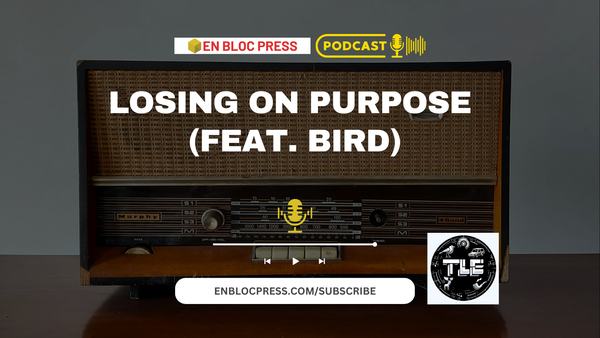Now Let Him Enforce It
"While defiance undermines constitutional checks and balances, it remains a debated area without explicit resolution in the Constitution"

Last week was a major one in US politics. Among other things, "the swamp" (via the federal judiciary) started fighting back in earnest against Trump's executive orders.
It turns out that when a strong executive branch tries to turn off the "infinite fake jobs and unlimited free money" pipeline for the entrenched bureaucrat class, feathers become ruffled, and things start to get dicey. At the time of this writing, it seems the FBI has been tipping off illegal aliens about upcoming ICE raids and that a federal judge has attempted to stop the Secretary of the Treasury from actually accessing the US Treasury system, lest he share the computer password with a DOGE employee named "Big Balls."
And if that sounds absurd, it's actually much worse. Many internet commentators are unironically suggesting that Kendrick Lamar—headliner of Sunday's Super Bowl LIX halftime show—produces good music and meaningful political commentary. In asking myself, "What is something as equally tragic as middle-aged office workers fart-huffing Kendrick Lamar's rap like he's a black Curtis Yarvin manufactured by the Pepsi Corporation?" both the US Civil War and the Trail of Tears came to mind.
Appropriately enough, both of these events are timely to brush up on, because each involves a US President openly defying the federal judiciary.
The rest of this post is a break from the usual and is more or less curated research piped directly from PerplexityAI, which I'm currently experimenting with. That said, if you've been following politics this week and want a refresher on the historical instances of US Presidents ignoring SCOTUS and some legal theory on whether the executive is obliged to obey the judiciary, you may find value in it.
This Week: Judiciary Steps In Against Trump
This week, several judicial actions blocked key initiatives of the Trump administration. Below is a summary of the major decisions:
- Federal Funding Freeze: A federal judge in Rhode Island ruled that the Trump administration violated an earlier order to unfreeze billions in federal grants. The administration's attempt to appeal this decision and reinstate the funding freeze was denied by the 1st U.S. Circuit Court of Appeals, which emphasized the lack of legal basis for the freeze. The funding freeze affected critical programs such as Medicaid, school lunches, and housing subsidies[2][7][10].
- Birthright Citizenship: Multiple federal judges, including one in New Hampshire, blocked President Trump's executive order seeking to end birthright citizenship for certain children born in the U.S. These rulings cited constitutional protections under the Fourteenth Amendment and marked significant setbacks for the administration[1][11].
- Diversity, Equity, and Inclusion (DEI) Programs: Federal groups challenged two executive orders aimed at dismantling DEI initiatives across federal agencies and contractors. The lawsuits argue that these orders violate constitutional rights, including free speech and due process, and exceed presidential authority by interfering with congressional control over federal spending[3][5].
- Access to Treasury Systems: A federal judge temporarily restricted Elon Musk's Department of Government Efficiency from accessing sensitive Treasury Department payment systems. This decision followed concerns over privacy and security risks associated with Musk's efforts to overhaul government operations[1].
- Transgender Rights: Judges also paused policies targeting transgender individuals, including restrictions on their placement in prisons aligned with their gender identity and access to gender-affirming medical care in federal prisons[8].
These rulings reflect ongoing judicial pushback against several controversial policies introduced during President Trump's second term, highlighting tensions between the executive branch and the judiciary over constitutional limits and separation of powers.
Citations:
[1] https://abcnews.go.com/Politics/trump-vance-musk-aim-courts-judges-halt-2nd/story?id=118649658
[2] https://abcnews.go.com/Politics/trump-reignites-legal-fight-freezing-billions-federal-funding/story?id=118695690
[3] https://ogletree.com/insights-resources/blog-posts/dei-at-stake-federal-groups-challenge-trumps-efforts-to-curb-inclusivity/
[4] https://www.newsweek.com/full-list-judges-thwarted-trump-administration-2029340
[5] https://www.aalrr.com/newsroom-alerts-4115
[6] https://www.skadden.com/insights/publications/executive-briefing/overview-of-trumps-executive-actions
[7] https://www.nytimes.com/2025/02/10/us/trump-unfreezing-federal-grants-judge-ruling.html
[8] https://www.forbes.com/sites/alisondurkee/2025/02/10/here-are-all-the-major-lawsuits-against-trump-and-musk-judge-keeps-federal-buyout-plan-on-hold-for-now/
[9] https://www.justsecurity.org/107087/tracker-legal-challenges-trump-administration-actions/
[10] https://www.nbcnews.com/politics/donald-trump/appeals-court-rejects-trump-administration-bid-reinstate-funding-freez-rcna191671
[11] https://www.aclu.org/press-releases/federal-court-blocks-trump-birthright-citizenship-executive-order
[12] https://www.reuters.com/legal/usaid-contractors-join-others-suing-trump-administration-over-dismantling-agency-2025-02-11/
[13] https://www.forbes.com/sites/alisondurkee/2025/02/11/here-are-all-the-major-lawsuits-against-trump-and-musk-judge-shoots-down-trumps-latest-attempt-to-freeze-funding/
[14] http://doggett.house.gov/media/in-the-news/forbes-here-are-all-major-lawsuits-against-trump-and-musk-usaid-shutdown-sparks
[15] https://www.aclu.org/news/civil-liberties/trumps-attempt-to-unilaterally-control-state-and-local-funding-is-dangerous-dumb-and-undemocratic
[16] https://www.npr.org/2025/02/11/nx-s1-5292199/retired-federal-judge-nancy-gertner-trump-federal-funding-freeze-restraining-order
[17] https://www.npr.org/2025/02/08/g-s1-47098/trump-arbitrary-lawsuits-gender-executive-actions
[18] https://www.usatoday.com/story/news/politics/2025/02/08/trump-administration-judges-court-policy-block/78258862007/
[19] https://www.cnn.com/2025/02/11/politics/how-the-courts-have-kept-pace-with-trumps-breakneck-effort-to-remake-the-government/index.html
[20] https://www.reuters.com/world/us/trump-asks-us-court-end-judicial-overreach-allow-funding-freezes-2025-02-11/
Andrew Jackson: SCOTUS Defiance
President Andrew Jackson defied the Supreme Court in the case of Worcester v. Georgia (1832). The Court, led by Chief Justice John Marshall, ruled that Georgia's laws extending state authority over Cherokee lands were unconstitutional, affirming the Cherokee Nation's sovereignty. Despite this, Jackson refused to enforce the decision, reportedly saying (though likely apocryphal), "John Marshall has made his decision; now let him enforce it"[1][4][8].
Jackson's refusal to act allowed Georgia to ignore the ruling and continue its policies against the Cherokee. This defiance aligned with Jackson's support for states' rights and his broader agenda of Indian removal, culminating in the forced relocation of Native Americans under the Indian Removal Act of 1830[5][9][11]. His inaction highlighted the limits of judicial power without executive enforcement.
Citations:
[1] https://www.fjc.gov/history/administration/executive-enforcement-judicial-orders
[2] https://en.wikipedia.org/wiki/Cherokee_Nation_v._Georgia
[3] https://millercenter.org/president/jackson/domestic-affairs
[4] https://www.thirteen.org/wnet/supremecourt/antebellum/history2.html
[5] https://civics.supremecourthistory.org/article/the-cherokee-nation-cases/
[6] https://www.reddit.com/r/AskHistorians/comments/8ibhts/how_did_president_andrew_jackson_get_away_with/
[7] https://www.thirteen.org/wnet/supremecourt/antebellum/landmark_cherokee.html
[8] https://en.wikipedia.org/wiki/Worcester_v._Georgia
[9] https://www.pbs.org/wgbh/aia/part4/4p2959.html
[10] https://sustainatlanta.com/2015/04/02/remembering-the-time-andrew-jackson-decided-to-ignore-the-supreme-court-in-the-name-of-georgias-right-to-cherokee-land/
[11] https://history.state.gov/milestones/1830-1860/indian-treaties
What events precipitated Worcester v. Georgia?
The events leading up to Worcester v. Georgia (1832) were rooted in escalating tensions between the state of Georgia, the Cherokee Nation, and the federal government over land, sovereignty, and Native American rights.
- Cherokee Sovereignty and Georgia's Response: In 1827, the Cherokee Nation declared itself a sovereign government with its own constitution, asserting its independence within its territory. This angered Georgia leaders, who sought to abolish Cherokee governance and annex their lands. The discovery of gold on Cherokee land in 1829 further intensified white settlers' demands for access to these lands[1][2][4].
- Georgia's Anti-Cherokee Laws: In 1830, Georgia passed laws aimed at undermining Cherokee sovereignty. These included prohibiting white persons from living on Cherokee lands without a state-issued license and an oath of loyalty to Georgia. This legislation was part of a broader effort to pressure the Cherokee into leaving their land, especially after the Indian Removal Act of 1830 was signed into law by President Andrew Jackson[2][4][6].
- Missionary Involvement: Samuel Worcester and other missionaries were living in Cherokee territory and supporting the Cherokee Nation by providing legal and political advice against Georgia's actions. They refused to comply with Georgia's licensing law, arguing that it violated federal treaties recognizing Cherokee sovereignty. In 1831, Worcester and others were arrested, convicted, and sentenced to hard labor for defying Georgia's law[1][4][6].
- Legal Challenges: The Cherokee Nation had previously attempted to challenge Georgia's actions in Cherokee Nation v. Georgia (1831), but the Supreme Court dismissed the case on jurisdictional grounds, ruling that the Cherokee were a "domestic dependent nation." However, Worcester's case provided a new opportunity to contest Georgia's overreach in federal court[2][6].
These events culminated in Worcester v. Georgia, where the Supreme Court ruled that Georgia's laws were unconstitutional because they violated federal treaties affirming Cherokee sovereignty. Despite this legal victory for Worcester and the Cherokee Nation, President Andrew Jackson refused to enforce the ruling, allowing Georgia to continue its policies of dispossession, which ultimately led to the forced removal of the Cherokee people on the Trail of Tears[2][4][6].
Citations:
[1] https://www.todayingeorgiahistory.org/tih-georgia-day/worcester-v-georgia/
[2] https://kids.britannica.com/kids/article/Worcester-v-Georgia/628002
[3] https://www.digitalhistory.uh.edu/disp_textbook.cfm?psid=691&smtid=3
[4] https://www.britannica.com/topic/Worcester-v-Georgia
[5] https://study.com/academy/lesson/worcester-v-georgia-summary-lesson-quiz.html
[6] https://en.wikipedia.org/wiki/Worcester_v._Georgia
[7] https://theamericanleader.org/timeline-event/worcester-v-georgia/
[8] https://www.georgiaencyclopedia.org/articles/government-politics/worcester-v-georgia-1832/
[9] https://www.oyez.org/cases/1789-1850/31us515
[10] https://kids.britannica.com/students/article/Worcester-v-Georgia/607299
[11] https://teachingamericanhistory.org/document/worcester-v-georgia-2/
[12] https://supreme.justia.com/cases/federal/us/31/515/
How did Andrew Jackson's actions impact the Cherokee Nation?
Andrew Jackson's actions had devastating impacts on the Cherokee Nation. His support for the Indian Removal Act of 1830 and refusal to enforce Supreme Court rulings protecting Cherokee sovereignty led to the forced relocation of the Cherokee people. Despite legal victories in cases like Worcester v. Georgia, Jackson backed Georgia's encroachments on Cherokee lands, undermining their sovereignty and promoting removal policies[2][5].
In 1835, a minority faction of the Cherokee signed the Treaty of New Echota, which ceded their lands in exchange for territory west of the Mississippi. The majority of Cherokees opposed this treaty, but it was ratified by Congress and used to justify their removal[1][3]. In 1838, under Jackson's successor, Martin Van Buren, U.S. troops forcibly removed thousands of Cherokees in what became known as the Trail of Tears. Approximately 4,000 Cherokees died during this brutal journey due to disease, starvation, and harsh conditions[6][8].
The forced relocation shattered Cherokee society, leading to immense loss of life and cultural disruption. Survivors faced internal divisions over the treaty's legitimacy but eventually reunited under a new constitution in Indian Territory (modern-day Oklahoma)[6].
Citations:
[1] https://www.gilderlehrman.org/history-resources/spotlight-primary-source/andrew-jackson-cherokee-tribe-1835
[2] https://millercenter.org/president/jackson/domestic-affairs
[3] https://www.archives.gov/milestone-documents/jacksons-message-to-congress-on-indian-removal
[4] https://www.neh.gov/article/trails-tears-plural-what-we-dont-know-about-indian-removal
[5] https://www.smithsonianmag.com/history/the-cherokees-vs-andrew-jackson-277394/
[6] https://www.cherokee.org/about-the-nation/history/
[7] https://www.pbs.org/wgbh/aia/part4/4p2959.html
[8] https://www.nps.gov/articles/the-trail-of-tears-and-the-forced-relocation-of-the-cherokee-nation-teaching-with-historic-places.htm
What were the immediate consequences for Samuel Worcester and the other missionaries after the Supreme Court's decision?
After the Supreme Court's decision in Worcester v. Georgia (1832), Georgia ignored the ruling and continued to imprison Samuel Worcester and other missionaries. Worcester and Elias Butler were sentenced to four years of hard labor. Despite widespread criticism, Georgia refused to release them until January 1833, when Governor Wilson Lumpkin persuaded the legislature to repeal the law under which they were convicted. Worcester and the others eventually accepted a pardon under pressure from the governor, lawyers, and the American Board, effectively ending their legal fight for Cherokee sovereignty[1][3][4].
Citations:
[1] https://www.georgiaencyclopedia.org/articles/government-politics/worcester-v-georgia-1832/
[2] https://kids.laws.com/worcester-v-georgia
[3] https://southbound.substack.com/p/when-georgia-persecuted-christian
[4] https://www.britannica.com/topic/Worcester-v-Georgia
[5] https://theamericanleader.org/timeline-event/worcester-v-georgia/
[6] https://www.okhistory.org/publications/enc/entry?entry=WO020
[7] https://teachingamericanhistory.org/document/worcester-v-georgia-2/
[8] https://spartacus-educational.com/WWworcester.htm
Abraham Lincoln Defies Taney:
During the Civil War, President Abraham Lincoln's suspension of habeas corpus and his defiance of a Supreme Court ruling sparked significant constitutional controversy. The writ of habeas corpus, protected under Article I, Section 9 of the U.S. Constitution, ensures that individuals cannot be detained unlawfully without appearing before a court. However, the Constitution allows its suspension "in cases of rebellion or invasion" when public safety requires it.
Lincoln's Suspension of Habeas Corpus
Lincoln first suspended habeas corpus on April 27, 1861, in Maryland, a critical border state where Confederate sympathies threatened Union security. This action authorized military commanders to detain individuals without trial if they posed a threat to public safety. Lincoln justified his decision as necessary to suppress rebellion and maintain order during an unprecedented national crisis. Over time, the suspension expanded to other regions and applied broadly to those accused of disloyalty or undermining the Union war effort[1][3][4].
The Ex Parte Merryman Case
Lincoln's actions were challenged in the 1861 case Ex Parte Merryman. SCOTUS Chief Justice Roger Taney, acting as a circuit judge, ruled that Lincoln's suspension of habeas corpus was unconstitutional because the power to suspend the writ rested with Congress, not the president. Taney asserted that Lincoln had overstepped his authority by unilaterally suspending this fundamental right and detaining individuals like John Merryman without judicial oversight[3][7].
Despite Taney's ruling, Lincoln ignored it. He did not comply with the order to release Merryman and continued to assert his authority to suspend habeas corpus when he deemed it necessary for public safety. Lincoln later defended his actions in a message to Congress, arguing that extraordinary measures were justified during rebellion to preserve the Union. He suggested that waiting for congressional approval might have jeopardized national security in a rapidly evolving crisis[3][4][7].
Congressional Response and Legal Developments
Congress eventually addressed the issue by passing the Habeas Corpus Suspension Act on March 3, 1863. This legislation retroactively authorized Lincoln's previous suspensions and granted him explicit authority to suspend habeas corpus for the remainder of the war. This act provided legal cover for Lincoln's actions but did not resolve debates about their constitutionality[4][8].
Legacy and Constitutional Implications
Lincoln's defiance of Taney's ruling and his broad use of executive power set a controversial precedent. Critics argue that he violated constitutional principles by ignoring judicial authority and concentrating power in the executive branch. Supporters contend that his actions were necessary to preserve the Union during an existential crisis. The Supreme Court later addressed related issues in Ex Parte Milligan (1866), ruling that military trials for civilians were unconstitutional when civilian courts were operational, further underscoring limits on executive wartime powers[5].
In summary, Lincoln's suspension of habeas corpus and disregard for Chief Justice Taney's ruling reflect a tension between constitutional norms and executive action during emergencies. While his actions were arguably unconstitutional under strict interpretation, they were justified by many as essential for national survival during the Civil War.
Citations:
[1] https://www.gilderlehrman.org/history-resources/spotlight-primary-source/proclamation-suspension-habeas-corpus-1862
[2] https://www.wicourts.gov/courts/supreme/docs/famouscases04.pdf
[3] http://civildiscourse-historyblog.com/blog/2015/1/1/illegal-lincoln-abraham-lincoln-and-habeas-corpus
[4] https://quod.lib.umich.edu/j/jala/2629860.0029.205/--lincoln-s-suspension-of-the-writ-of-habeas-corpus?rgn=main%3Bview%3Dfulltext
[5] https://www.digitalhistory.uh.edu/disp_textbook.cfm?psid=4018&smtID=3
[6] https://digitalcommons.lmunet.edu/lmulrev/vol8/iss1/6/
[7] https://constitutioncenter.org/blog/lincoln-and-taneys-great-writ-showdown
[8] https://civilwaronthewesternborder.org/timeline/habeas-corpus-suspension-act
[9] https://constitution.congress.gov/browse/essay/artI-S9-C2-1/ALDE_00001087/
[10] https://www.fjc.gov/sites/default/files/trials/merryman_psa.pdf
[11] https://www.reddit.com/r/CIVILWAR/comments/1gwgd31/abraham_lincoln_suspended_habeas_corpus_at_the/
[12] https://www.docsteach.org/activities/printactivity/was-lincolns-suspension-of-habeas-corpus-during-the-civil-war-justified
Does the Constitution bind the executive branch to obey the Supreme Court?
The executive branch is constitutionally expected to obey the Supreme Court, as the judiciary's role includes interpreting the law and ensuring compliance under the principle of judicial review, established in Marbury v. Madison (1803)[6]. Article II of the Constitution requires the president to "take Care that the Laws be faithfully executed," which can be interpreted as an obligation to enforce court rulings[2][6].
However, there is no direct enforcement mechanism compelling a president to act on Supreme Court decisions. Historical examples, such as Andrew Jackson’s defiance in Worcester v. Georgia and Abraham Lincoln’s actions during Ex parte Merryman, show that executive compliance often depends on political will[2][7]. While defiance undermines constitutional checks and balances, it remains a debated area without explicit resolution in the Constitution[2][3].
Citations:
[1] https://constitutioncenter.org/blog/defining-the-presidents-constitutional-powers-to-issue-executive-orders
[2] https://www.fjc.gov/history/administration/executive-enforcement-judicial-orders
[3] https://supreme.justia.com/cases-by-topic/separation-of-powers/
[4] https://www.fjc.gov/history/administration/judicial-review-executive-orders
[5] https://www.fedmanager.com/news/supreme-court-strikes-executive-branch-power-in-trio-of-rulings
[6] https://www.supremecourt.gov/about/constitutional.aspx
[7] https://www.reddit.com/r/ezraklein/comments/1id2863/what_actually_happens_if_the_executive_branch/
[8] https://www.oyez.org/issues/419
And so there you have it – while it's probably good for the sake of public order and the appearance of legitimacy that the court system be obeyed, there is no formal mechanism to enforce this, and there is no explicit obligation that a President carry out the will of a court. You can just do things, up to and including not caring what a guy in a fancy robe thinks. How many battalions does the court have? None.
And I do believe in this moment that Trump could get away with ignoring the courts. After all, the energy is high right now, and we're talking about Trump taking on pretty open instances of fraud and corruption. But I don't think he needs to play the ace yet because the odds are good he can win with a king; there's a real chance SCOTUS will side with him anyway when some of these cases inevitably reach the high court.
Of course, anything could happen. I've been very pleased with the administration so far. But it's early in the game. When you start backing desperate bureaucrats into a corner, and their only way out is to take a pay cut and get a real job, well, do not expect them to go quietly into that good night.
See everyone next time,
-Lee





